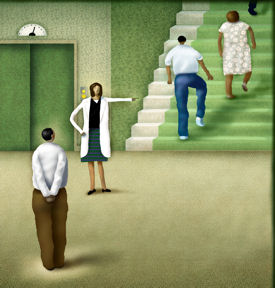CMS demo aims to help seniors stay healthy, independent
CMS is partnering with private companies to address multiple health risk factors that contribute to senior's chronic diseases.
A Medicare Senior Risk Reduction Demonstration (SRRD) project is partnering public initiative with the know-how of a handful of privately held care management organizations to address multiple health risk factors that contribute to chronic diseases. Private physicians don't have a formal role but might benefit anyway if one of the 85,000 participants comes into their office.
In April 2009 CMS will assign approximately 17,000 Medicare beneficiaries apiece to private sector health management organizations. Two-thirds of participants ages 67 to 75 will receive health education and behavior change materials, as well as health coaching by mail, telephone or Internet. Participants can share this information directly with their physicians. The other third will act as a control group.
The SRRD will examine whether health promotion and management programs developed and tested in the private sector, primarily for large employers, can help beneficiaries manage their health and delay the onset or progression of chronic disease. The demonstration will address physical inactivity, obesity, smoking, depression, high blood pressure, high cholesterol and high blood glucose, as well as underuse of Medicare's preventive benefits.
The aim of SRRD is to find ways to help Medicare beneficiaries identify health risks, including risk factors for diseases they might not know they have, and provide them with information and support they need to take better care of themselves.
“In addition to reducing overall long-term Medicare costs, we believe it's critically important to find effective risk reduction strategies in Medicare because of the increasing numbers of people entering the program as well as the desire of many people to take action to remain independent, healthy and active as they get older,” said Angela Camilleri, director of the program for Pfizer, a participating private sector organization.
The demonstration project is based on promising findings from a CMS-sponsored study showing that seniors who reduce their modifiable health risks can forestall disability, reduce health care use and save Medicare money. [“Can health promotion programs save Medicare money?” Goetzel RZ, Shechter D. Clin Interv Aging. 2007;2(1):117-22.]
Once beneficiaries enroll in the demonstration and fill out a health assessment survey, their assigned health management organization will generate a customized health action plan that they are encouraged to discuss with their physicians
While there is no formal role for the beneficiary's personal physician in the SRRD, a CMS official working on the projects pointed out that the information physicians get from the health action plan and their coach might help them better structure patient visits. For example, they'll know what risk factors to focus on, which might make visits more efficient.
In addition, participants will receive referrals to national and local programs, such as physical activity, falls prevention, smoking cessation and other types of health promotion programs, or if needed, referrals to their physician for recommended preventive services.
Michael Staufacker, director of program development for StayWell Health Management, another of the participating health management organizations, said the demonstration presents a tremendous opportunity to demonstrate the potential impact of health management and prevention programs for the senior demographic.
“If communications are clear and easy to understand, Medicare beneficiaries can achieve high participation levels in health management programs,” said Mr. Staufacker. “In workplace settings, we have seen that when there is high participation in health assessment and health behavior change programs it leads to health behavior change, risk reduction and cost savings at a very high level.”
David B. Reuben, FACP, a professor of geriatrics at the David Geffen School of Medicine at UCLA, said the demonstration project is a step in the right direction.
“It aims to get people engaged earlier with the idea that healthier lifestyle behaviors may prevent or delay complications,” said Dr. Reuben. “That's a really good focus because once these complications emerge we're dealing with a whole different population, and we need to bring an entirely different set of resources to the table because by then we're playing catch-up.”
The downside of SRRD, according to Dr. Reuben, is that Medicare has a long history of looking for quick returns. “The returns may not be quick with this demonstration. It may take five to 10 years before they start seeing benefits. If CMS stops looking after three years, the benefits may not be quantifiable.”



